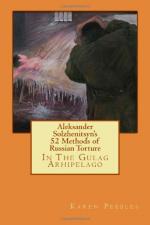|
This section contains 371 words (approx. 2 pages at 300 words per page) |

|
[The Second World War] is the only major experience of Solzhenitsyn's life that has been conspicuously absent from his work. But it is the subject of Prussian Nights…. Poetically it is not very distinguished, so that as in Longfellow's poems the main interest is in the story, since the traditional metre does indeed carry the narrative effectively along….
[This] is the very reverse of a patriotic poem. While he was in East Prussia, Solzhenitsyn was arrested for criticising Stalin's conduct of the war, and sentenced to eight years' hard labour. Not, in the light of the horrifying events of this century which many millions of us have seen and endured, a particularly terrible experience to have to suffer. But it is the central experience which has moulded Solzhenitsyn's vision, so that Stalin and Communism have become for him the one great enemy. He ignores the far worse horrors...
|
This section contains 371 words (approx. 2 pages at 300 words per page) |

|


